For export to Asian and African markets
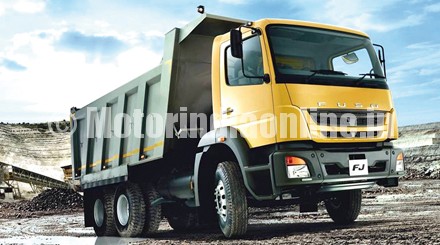
Daimler India Commercial Vehicles Pvt. Ltd. (DICV), a 100 per cent wholly-owned subsidiary of Daimler AG, Stuttgart, Germany, along with Mitsubishi Fuso Truck and Bus Corporation (MFTBC), Japan, a Daimler company, launched on May 23 the ‘FUSO’ brand trucks manufactured at the DICV plant at Oragadam, near Chennai.
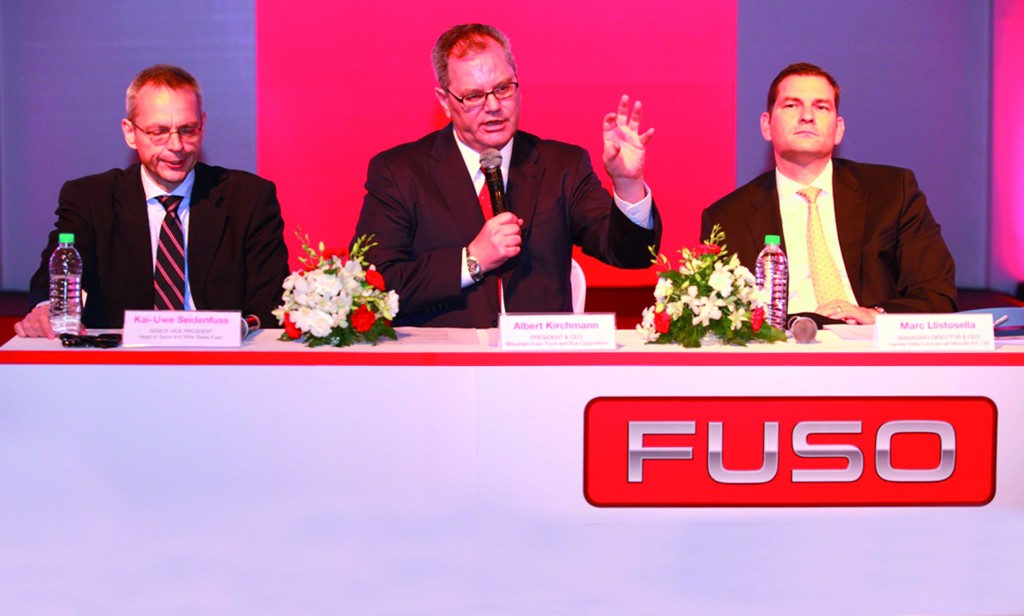
The new FUSO trucks are based on the Daimler trucks technical platforms and will be exported to important markets in Asia and Africa. This range provides the FUSO brand fresh impetus in addressing product segments that were not available earlier.
Dr. Albert Kirchmann – Head – Daimler Trucks Asia and President & CEO, MFTBC, said on the occasion: “Today is an exciting moment for us. The New Asia Business Model will enable us to unlock full potential among MFTBC and DICV, and we are already bringing strategies into reality. We have done our homework in repositioning our MFTBC operations, ramping up DICV business, and establishing presence of the BharatBenz brand in India. Coming out of the unimaginable 2011 earthquake crisis in Japan, we have achieved a record operational result in 2012. Now, with the strategic FUSO truck ready for launch for export outside of India, our growth story ‘FUSO 2015’ is at full speed ahead.”
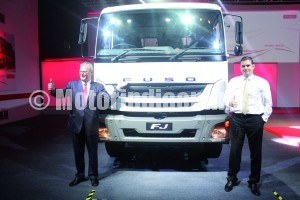
According to him, the company is very keen to expand and promote the FUSO brand in Asia. The trucks would be exported to various countries in the region in CBU condition using the modern facilities available at the Oragadam plant.
In the first phase starting from June, FUSO would be exported to Sri Lanka, Uganda, Kenya, Brunei, Mozambique, Zambia, Bangladesh, Tanzania and Mauritius, and in the second phase in 2014, it would be exported to Thailand, Malaysia, Indonesia, Malawi and Seychelles. With the top priority accorded to product quality, the FUSO vehicles that would conform to world standard, he added.
Mr. Marc Llistosella, Managing Director and CEO – DICV, observed: “Over the last 4 years DICV has made clear promises to deliver the most-reliable and cost-efficient trucks to the Indian trucker, and we have delivered on all of them. The launch of FUSO trucks from our manufacturing facility at Chennai is a clear demonstration of the same exacting quality standards practised by the Daimler facilities around the world. The export potential of DICV adds strength to our business plan while also encouraging the possibility of higher sourcing from the Indian suppliers”.
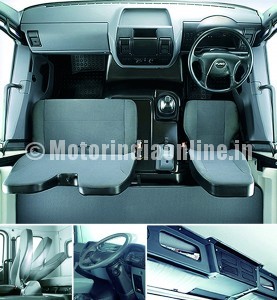
Mr. Marc Llistosella further said that with the launch of FUSO vehicles for export, Daimler India has very well fulfilled its commitment to the Indian market. Quality-wise, the FUSO brand would match the BharatBenz standard.
Referring to the success story of Daimler India, he was delighted to point out that with the company operations started by an inspiring team of technicians just five years ago, it was not only able to successfully roll out BharatBenz for the Indian market but also could commence export of the world renowned FUSO brand of commercial vehicles in a short span. Since the CV industry worldwide is expected to grow multifold, the company fully realises that there is huge potential to tap in order to further strengthen its market leadership.
“We have the right product tailor-made to other countries. Fuel efficiency is no longer a fancy term for Daimler, because the vehicle produced has proved its maximum fuel economy. It was in 2006 that Daimler found from the world trucking map that the company is missing a lot in Asia and Africa. Hence the launch of FUSO is the answer to the missing link. Today the Oragadam plant covering 400 acres has not only been producing commercial vehicles ranging from 9T to 49T with 85 per cent indigenisation, but also created jobs four 4,000 persons”, Mr. Marc added.
In his address, Mr. Masashi Kogame, Senior Vice President, Director of Production Control Department, Mitsubishi Fuso Truck and Bus Corporation, observed that with the state-of-the-art facility and high level of automation, 17 different models from two brands based purely on the Daimler Truck Operating System (TOS) would be introduced. With the latest technology and uncompromised Daimler standards, the FUSO trucks are now benchmarked for quality, cost and fuel efficiency.
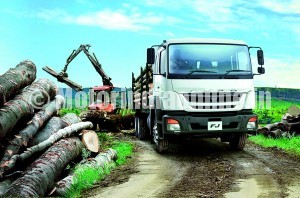
Mr. Kai-Uwe Seidenfuss, Senior Vice President – Sales and After Sales, MFTBC, had this to say: “Our new line-up of fuel-efficient, state-of-the-art FUSO trucks will fill the growing customer demand in Asia and Africa, thus adding further growth for Daimler Trucks Asia. Moving ahead, we will supply a total of 15 export markets starting with Sri Lanka in June followed by other select markets.”
He also said that all the FUSO vehicles are built on trusted quality, backed by solid functional design, economic efficiency and wider choice. Designed to maximise customer profitability, pricing would drive the competitiveness of the vehicle brand.
‘Asia Business Model’
The FUSO trucks manufactured at DICV’s Oragadam plant comprise five models spanning medium/heavy-duty (25-49 tonnes referred to as ‘FJ’, ‘FO’ & ‘FZ’) and light/medium-duty (9-16 tonnes referred to as ‘FA’ & ‘FI’). Daimler Truck’s ‘Asia Business Model’ clearly paves the way for better synchronisation of its available strengths. While the Indian and Japanese markets remain Trucks Asia’s important focus markets, the global economy shows significant growth potential shifting to Asia and its surrounding developing markets like Africa. The new Asia Business Model is designed to address these trends and strengthen Trucks Asia mid- to long-term operations.
Focus areas
Strong focus will be placed on an integrated Trucks Asia product portfolio which will offer a wider choice to customers. The new strategic FUSO truck just unveiled is one successful example of short-term projects underway between DICV and MFTBC.
An integrated R&D approach will enable Trucks Asia to leverage Indian cost-efficiency while providing DICV access to MFTBC R&D knowhow and capacity and vice versa. The global Daimler Trucks Product Engineering under which one global head will ensure stronger synergy effects as has already proved by the rest of the Daimler Trucks integrated matrix organization.
Great synergies are targeted under the newly-aligned Trucks Asia operations from leveraging DICV’s supplier base. The tried and tested supplier base in India through the experience of creating BharatBenz trucks offers the advantage for a co-ordinated procurement and supplier management function to ensure greater cost-efficiencies while maintaining high quality.
Kawasaki and Chennai production hubs
Trucks Asia under the new Asia Business Model is moving towards an optimized Asia footprint with two major production hubs in Kawasaki and Chennai. The Kawasaki factory is positioned as the central completely built-up and knocked-down vehicle production hub, especially in terms of delivering the highest standards to meet the ever-growing customer requirements in Japan and international markets.
The Chennai plant will concentrate on deliveries of Mercedes-Benz and BharatBenz trucks for India and for export of FUSO trucks for select markets in Asia and Africa, thus complementing the Kawasaki hub capacity and the traditional product range.
The 50 glorious years of FUSO CANTER
Daimler is celebrating the 50th Anniversary of the Fuso CANTER this year. The first generation of the Canter truck was launched in March 1963. Fifty years and eight generations later, Daimler is celebrating the truck as a best-selling hit with global sales of over 3,700,000 units since the market launch in its home market Japan.
The light-duty Fuso Canter truck is the flagship of the Daimler subsidiary, Mitsubishi Fuso Truck and Bus Corporation (MFTBC), and is in demand in more than 150 countries around the world. The Fuso Canter produced for the European market in Tramagal, Portugal, since 1980 enjoys growing popularity in Europe.
Since last year, the Fuso Canter truck is also available in Europe as a hybrid variant, which uses up to 23 per cent less fuel than a comparable conventional Canter and pays off within three to four years.
Most recently, in Ireland the economical Fuso Canter Eco Hybrid picked up the “Best Energy Efficient Product Award” at the European “SEAI Energy Show 2013” (Sustainable Energy Authority of Ireland) in Dublin. In addition, the hybrid truck was also honoured with the prestigious “Irish Green Commercial of the Year 2013” Award.
In Japan, the Fuso Canter Eco Hybrid has even bagged the prestigious “RJC Car of the Year Award”. This was the first time that the Award has ever been presented to a commercial vehicle manufacturer. It was given to the Fuso Canter at the “Automotive Researcher’s and Journalist’s Conference” (RJC), end 2012.
Dr. Albert Kirchmann, President and CEO, MFTBC, said: “We are proud of the successes we have enjoyed with the Fuso Canter for over five decades. Fifty years of product history can vouch for the trust and satisfaction our customers have in the Fuso Canter, which stands out with its high fuel efficiency and optimal total cost of ownership.”
In India, the Canter is a well known name in the trucking industry. In fact, the very name is synonymous with light-duty trucks and is even commonly used as a generic term referring to light-duty trucks. The BharatBenz light/medium-duty trucks carry the genes of the ‘Canter’, besides the ‘Fighter’.
In addition to the 50th anniversary of the Fuso Canter truck, the MFTBC subsidiary, founded in January 2003, is also celebrating the ten-year company anniversary and the 80th birthday of the Fuso brand, which has been in existence since 1932. MFTBC markets a broad range of products under the well-known commercial vehicle brand Fuso, which include the Canter and Guts light-duty trucks, the medium-duty Fighter truck, the Super Great heavy-duty truck, the Aero Star city bus, and the Aero Queen touring coach.
Milestones of the Fuso Canter
1963 First generation Canter T720
Cab-over truck with 2-ton payload
1968 Second generation Canter T90
All models fitted with high performance
engine. First full model change
1973 Third Canter Generation T200
Enhanced product line-up with
payload of 2.5 and 3 tons
1978 Fourth generation Canter
New line-up including wide-cab
with 3-ton payload
1985 Fifth generation Canter
Installed with newly developed
130 PS turbo engine
1991 One million units sold in Japan
1993 Sixth generation Canter
with improved aerodynamic properties
2002 Seventh generation Canter
Model upgraded for adaptation of
vehicle performance to world standards
2006 First generation Canter Eco Hybrid
2010 Eighth generation Canter
Equipped with BlueTec technology
and DUONIC dual clutch transmission
2012 Second generation Canter Eco Hybrid
Reaches a whole new dimension with
world’s first DUONIC dual clutch
transmission with hybrid technology